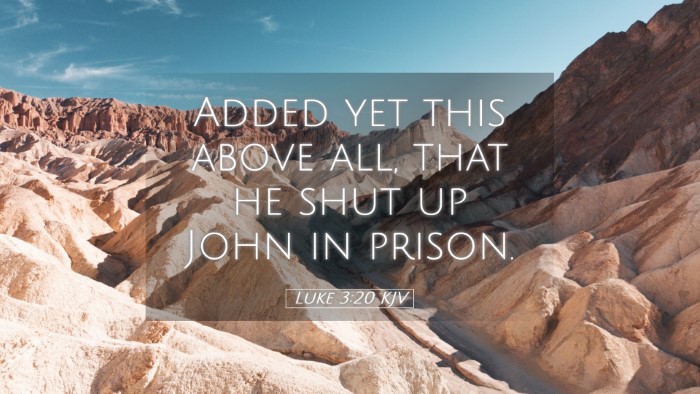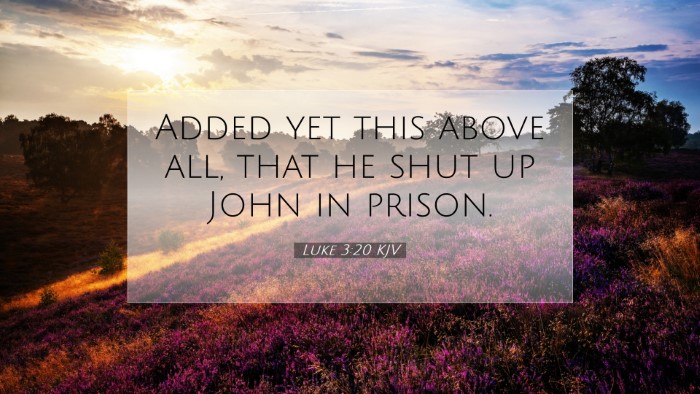Commentary on Luke 3:20
The verse Luke 3:20 states, "Added yet this above all, that he shut up John in prison."
Contextual Background
This verse occurs in a narrative detailing the ministry of John the Baptist, who preached repentance and baptized many in the Jordan River. He was a compelling figure who called out the sins of the people and leaders alike. The imprisonment of John signifies not only a personal tragedy but also a critical turning point in the unfolding of the Gospel narrative.
Insights from Matthew Henry
Matthew Henry emphasizes the significance of John the Baptist's prophetic role, which ultimately brings him into conflict with the political and religious authorities of his day, notably Herod Antipas. Henry observes that John’s imprisonment is a testament to the price of faithful ministry and the persecution that often accompanies it. He states:
- “Boldness in declaring the truth often leads to suffering.”
- “John's imprisonment reflects the fate that awaits those who stand firm in their conviction before tyrants.”
Furthermore, Henry remarks that God allows such injustices as a part of His divine plan, encouraging believers to hold steadfast in faith, even when faced with dire circumstances.
Insights from Albert Barnes
Albert Barnes provides an exposition of the implications surrounding John's imprisonment. He states that it serves as a somber reminder of the societal rejection of God's message and messenger. Barnes articulates that John's incarceration was not merely a political act but represented a spiritual battle:
- “The world often responds to divine truth with hostility and violence.”
- “Imprisonment may seem a setback, but it can become part of God's larger plan for advancing the Gospel.”
He insists that God’s purposes are not thwarted by human actions, and instead, such adversities can lead to greater works of God being made manifest in His timing.
Insights from Adam Clarke
Adam Clarke approaches the text with a focus on the character of Herod and the moral implications of his actions. Clarke notes that Herod's decision to imprison John arose from a combination of fear and moral cowardice. He comments:
- “Herod's actions serve as an illustration of how political power can corrupt moral judgment.”
- “John’s fearless denunciation of sin provokes hostility in those who wish to remain in their iniquities.”
Clarke reflects on the fate of John, suggesting that this imprisonment leads to the eventual martyrdom that emphasizes the call and cost of discipleship: “To speak the truth in a crooked generation often invites personal suffering.”
Theological Implications
The imprisonment of John the Baptist has several theological implications for contemporary readers, especially for pastors and theologians:
- Cost of Discipleship: True discipleship may lead to suffering. Believers are called to accept the reality that following Christ may lead to persecution.
- Divine Sovereignty: John's imprisonment fits within the scope of God's providence. It highlights the notion that human actions do not thwart divine plans.
- Call to Boldness: The account encourages believers to fearlessly proclaim the truth, even when facing societal pressures or opposition.
Practical Applications
For pastors and students, the events surrounding John the Baptist’s imprisonment provide ground for reflection and action:
- Preaching with Integrity: Emulate John in calling out sin and engaging culture with a biblical worldview.
- Support for Persecuted Believers: Foster a spirit of prayer and support for those suffering for their faith worldwide.
- Encouragement to Endure Trials: Use John’s story to encourage congregants facing personal trials, reminding them of God's ultimate plan and presence in suffering.
Conclusion
Luke 3:20 encapsulates the tragic yet profound truth about standing firm for God’s purpose. The imprisonment of John the Baptist serves as a pivotal moment in the biblical narrative that calls believers to consider the costs associated with faithfulness. Drawing insights from revered commentaries allows us to grasp the depth of this event and encourages us to apply its lessons in our lives and ministries.


